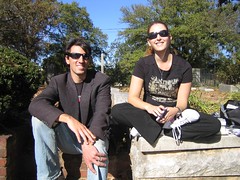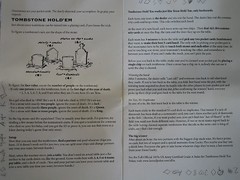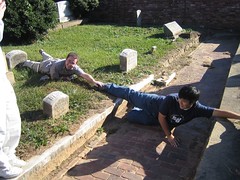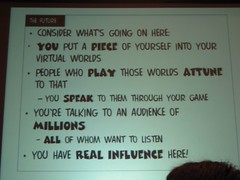

I was positively surprised at how many people showed up. Great because I put in more energy than usual when preparing the slides. Sam Lewis (who just moved to Atlanta to start his new job as lead designer for Cartoon Netwok’s new MMOG) was kind enough to help me out the day before, and when it was “done” I had this feeling of it being a mass of words that wouldn’t say anything to anyone. I know Sam knows what I mean, but that’s just because I have explained it at length. How do it quickly… We came up with a design: Designorama Online - an office type game where the players task is to make games – and tested if we could come up with a simple game that would illustrate the Mind Module and the story deamons. That was great fun, here is the sketch:
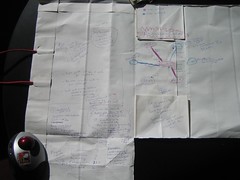
I was especially happy that Patrick Williams took the trouble of driving all the way from Athens. He is, toghether with Jonas Heide Smith editing the book “Gaming Cultures and Social Life” to which I made a small contribution. It was really nice meeting in person, and we went off to Starbucks with Hartmut.


Here are the slides from the talk
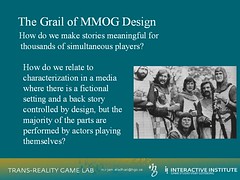
This is the description of the speech:
Title: The Holy Grail of MMOG Design: Supporting Players to Perform Meaningful Narratives
Speaker: Mirjam Eladhari
Date: Nov. 28, 2005
Time: 2:00pm
Room: TSRB 132
Abstract
One of trickiest problems in the design of massively multiplayer games is how to make the stories meaningful for all thousands of simultaneous players. Traditionally characterization is viewed as one of the cornerstones for a good narrative. But how do we relate to characterization in a media where there is a fictional setting and a back story controlled by design, but the majority of the parts are performed by actors playing themselves?
In this session we briefly touch upon
- The current game play paradigms of virtual game worlds,
- Characterization, self play and role play,
- The notion of heroism and the hero's journey,
- Basic conditions for the creation of narrative potential in massively multiplayer games.
What solutions can we build that use the creativity and sensitivity of the players to facilitate more emotional depth and more meaningful experiences of social game play?
The Mind Module is an attempt in this direction; an architecture for semiautonomous expressive avatars. The player would in the virtual game world not only take a virtual body into possession, but also a mind. This could give the player certain emotional biases towards other objects in the world, such as other players, and provide a basis for player generated stories that have an actual effect in game play terms.
An example implementation in production is the game prototype "The Garden of Earthly Delights" which is a pervasive massively multiplayer game that can be played both in the real world through cell phones as well as in a virtual world via a traditional 3D PC Client. The prototype is done in the work package "Massively Multiplayer Reaching Out", which is part of the EU funded IPERG project.
BIO
Mirjam Eladhari is lead game designer and researcher in the work package "Massively Multiplayer Reaching Out", which is part of the IPERG project. She is also working on her PhD thesis on the topic of "Player Character Mind Models for Deep Characterization and Emergent Story Construction in MMOGs". This research is conducted within the game research group at the Department of Technology, Art and New Media at Gotland University in Sweden, and within the School of Computing at the University of Teesside, UK. Mirjam has worked as a game programmer at Liquid Media in Sweden where she worked on a number of game titles including The Diamond Mystery of Rosemond Valley, a mystery game in real time 3D, for which she was the lead game programmer. She has also worked as technical lead and researcher at the Zero-Game Studio, a part of the Interactive Institute, primarily with the open research MMOG engine Purgatory.
